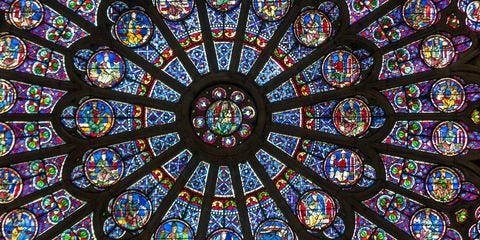On the End of Man
Yesterday I sent out a tweet that got a lot of traction on Twitter.
This tweet originated from my reading of the Baltimore Catechism 4 the previous night. Most of my tweets are inspired by my reading. I have always been a voracious reader and enjoy sharing my love of books with my two sons, ages 11 and 13. Twitter is a platform that allows me to reach large numbers of people who I hope can benefit from what I have read and the wisdom I have gleaned.
From the Baltimore Catechism 4:
“The end of a thing is the purpose for which it was made. The end of a watch is to keep time. The end of a pen is to write, etc. A thing is good only in proportion to the way it fulfills the end for which it was made. A watch may be very beautifully made, a very rare ornament, but if it will not keep time it is useless as a watch. The same may be said of the pen, or of anything else. Now for what purpose was man made? If we discover that, we know his end.
When we look around us in the world, we see a purpose or end for everything. We see that the soil is made for the plants and trees to grow in; because if there was no need of things growing, it would be better to have a nice clean solid rock to walk upon, and then we would be spared the trouble of making roads, and paving streets. But things must grow, and so we must have soil. Again, the vegetables and plants are made for animals to feed upon; while the animals themselves are made for man, that they may help him in his work or serve him for food. Thus it is evident everything in the world was made to serve something else.
What then was man made for? Was it for anything in the world? We see that all classes of beings are created for something higher than themselves. Thus plants are higher than soil, because they have life and soil has not. Animals are higher than plants, because they not only have life, but they can feel and plants cannot. Man is higher than animals, because he not only has life and can feel, but he has also reason and intelligence, and can understand, while animals cannot. Therefore we must look for something higher than man himself, but there is nothing higher than man in this world, and so we must look beyond it to find that for which he was made.
And looking beyond it and considering all things, we find that he was made for God—to know Him, to love Him, and to serve Him both in this world and in the next. Again, we read in the Bible (Gen. 1) that at the creation of the world all things were made before man, and that he was created last. Therefore, if all these things could exist without man, we cannot say he was made for them.
The world existed before him and can exist after him. The world goes along without any particular man, and the same may be said of all men. Neither was man made to stay here awhile to become rich, or learned, or powerful, because all do not become rich—some are very poor; all are not learned—some are very ignorant; all are not powerful—some are slaves. But since all men are alike and equal in this, that they have all bodies formed in the same way, and all souls that are immortal, they should all be made for the same end.
For example, you could not make a pen like a watch if you want it to write. Although pens differ in size, shape, etc., they have all one general form which is essential to them. So, although men differ in many things, they are all alike in the essential thing, viz., that they are composed of body and soul, and made to the image and likeness of God. Hence, as pens are made only to write with, so all men must have only one and the same end, namely, to serve God.”
Viva Christo Rey!
Rae





